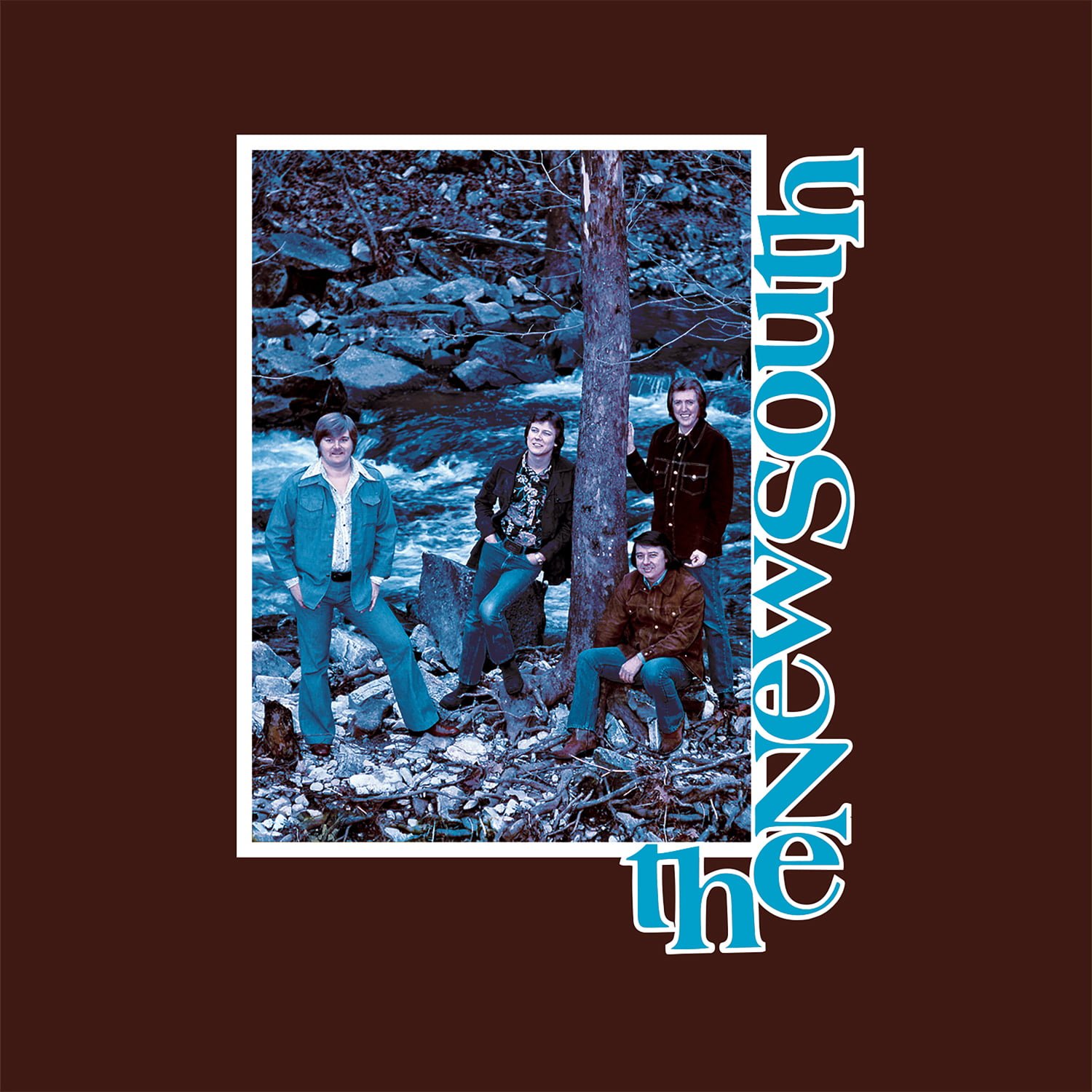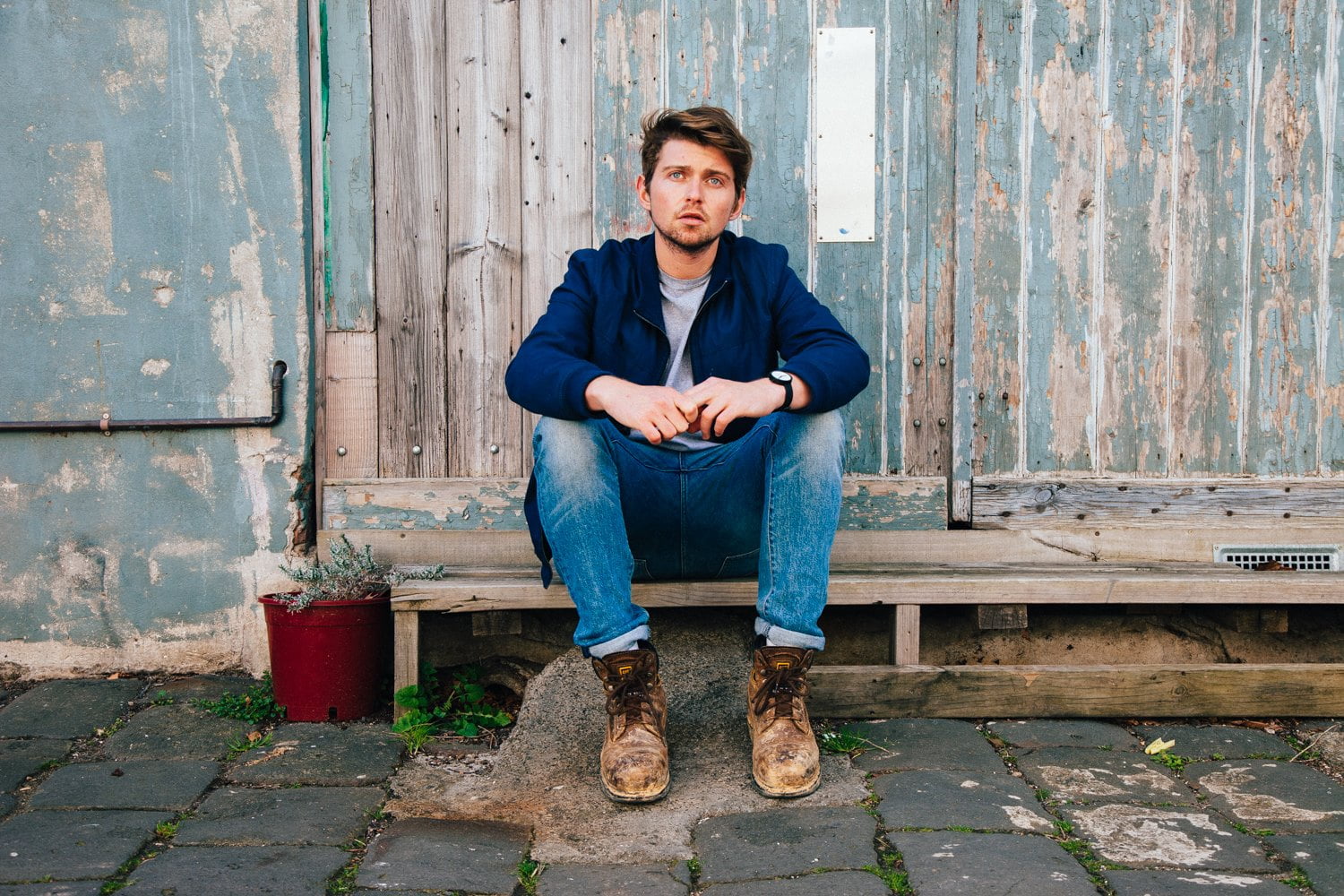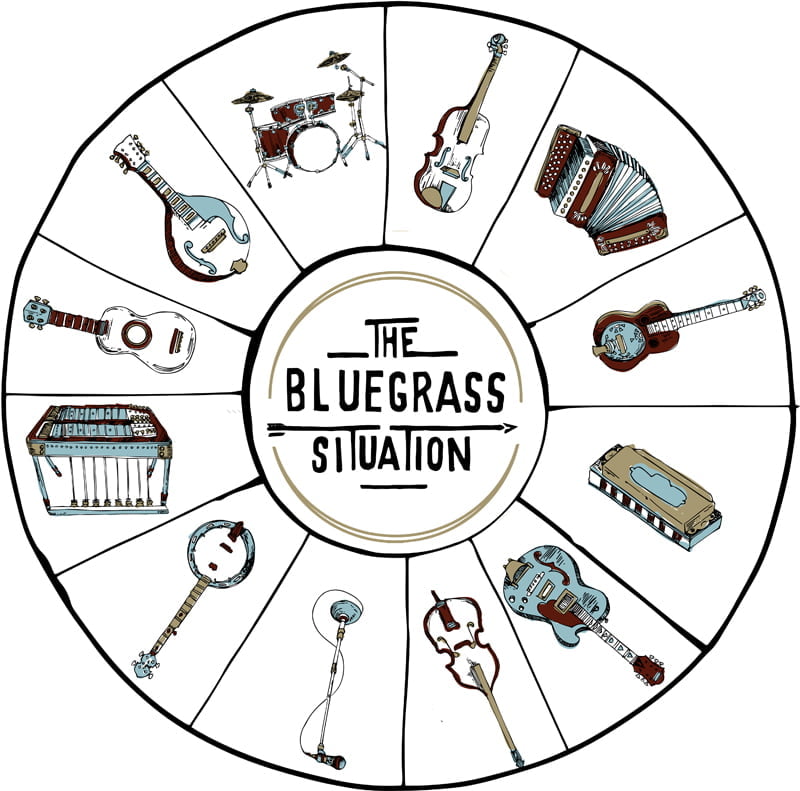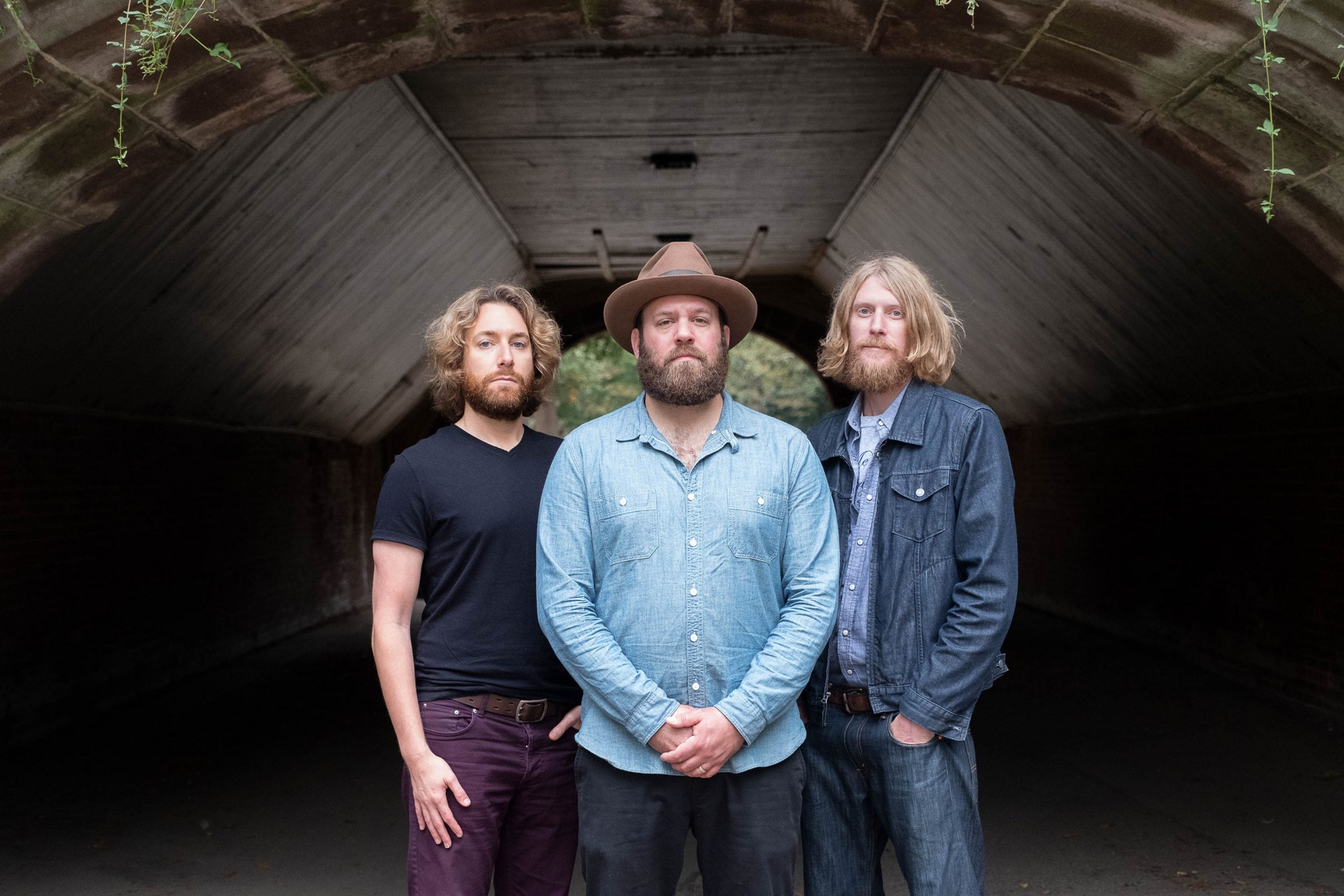The Convergence of 1975
What came together, fortuitously, and not that many months before the recording of 0044, was what Crowe biographer Marty Godbey called “the convergence of 1975.” It was a turn to the acoustic that brought a new freshness to the New South, and it really began in September 1974.
Tony takes credit for it. When Larry left around Labor Day 1974 to join Dickie Betts on tour, Tony really wanted to bring Ricky Skaggs into the band, and he thought that was what it would take — to turn away from the drums and electric bass and go all-acoustic, back to the roots, so to speak. A lot of bands had success with drums and electric instruments — the Osborne Brothers, for instance. Ricky had, himself, been playing with a plugged-in mandolin “and it just wasn’t him,” Tony says.
Sam Bush had filled in for a while after Larry left, but no one ever thoughtSam was cut out to play that many sets, that many nights of the week. And then came Ricky. He was leaving the Country Gentlemen. “I didn’t get to sing a lot in that band. They used me on ‘Lord, Protect My Soul’ or something that had real high singing in it, but mostly I was there to play fiddle. I didn’t have the opportunity to get to sing a lot. I guess the main reason I turned Emmylou’s job down is because, if I went with Emmylou, I didn’t think I would get to sing very much. I had already kind of made a promise to myself that I wouldn’t work in a band where I didn’t get to sing a lot. I wanted to really keep my singing chops up.”
Ricky came to Lexington and sat in for about 10 days. (“My God, that was a workout!”) The sound changed, and it felt real good to Tony. “I was trying as hard as I could to talk him into staying on, and Ricky made it real clear that he couldn’t take the drums, the electric bass, being plugged in.” He got Ricky to agree to stay for about a year, but there was one condition, Tony told J.D. “It wasn’t real hard to coerce Crowe into what was being offered to him: Ricky would stay with the band if it would go back to being a traditional bluegrass group … I think J.D. was ready to get back to the roots of bluegrass for himself anyway, not to mention that traveling on the road, he wouldn’t have to take drums and amplifiers and whatever else. Crowe was tired of drums … by that time, electric instruments and drums had already run their course. The change that happened overnight was really incredible.” Turning back to the purer sound brought a breath of fresh air into the New South.
A New Record Deal
The Rounders (Ken Irwin, Marian Leighton, and Bill Nowlin) were at the CrazyHorse Campground in Gettysburg, Pennsylvania, the weekend of August 17 and 18, 1974, for Carlton Haney’s 8th Annual Gettysburg Blue Grass Music Festival. They had their Volkswagen bus (in which all three slept on the road and at festivals) and their set-up — a record table where they sold their albums and those of other small independent labels. The New South (with Tony and Larry both) played those two days; others at the festival included the Osborne Brothers, the Seldom Scene, Jimmy Martin & the Sunny Mountain Boys, Del McCoury & the Dixie Pals, the Blue Sky Boys, and Mother Maybelle Carter and the Carter Family. Admission each day was $6.
The Rounders well knew of J.D.’s stature. J.D.’s band was active on the festival circuit and it was at Gettysburg when Rounder Records first asked J.D. to do a recording. The Rounders never dreamed that one of the hotter bands in the business would record for their small record label out of Massachusetts, so they asked J.D. about doing a banjo album. As Ken told Crowe biographer Marty Godbey, J.D. “at that time, was a legend in our eyes.”
A banjo album would have been a foot in the door; it also would have been a great album. It still would be. But a banjo album wasn’t what interested J.D. He said no. But Ken remembers being bowled over at what happened next: “A couple of hours later, J.D. and Hugh [J.D.’s manager at the time, Hugh Sturgill] came over and said they wanted to speak to us. They said he wasn’t interested in doing the banjo record at this point, but would we be interested in doing a band record?”
J.D. remembers, “I knew that we needed … I’d rather have a band album out than an instrumental album. Band albums do a lot better. We’d been talking about doing one with somebody before Ken and Marian ever approached us. I never was into instrumentals that much anyway.”
There actually had been a New South album that had been cut back in April 1973 for Starday, but for reasons that remain unknown today, the label never released it. It was very frustrating, at the time, for J.D. because it left the band without a product to sell and wondering what went wrong. And unable to record for anyone else for two years from the date of signing, which J.D. honored. The Starday recording featured some of the standard Nashvillestudio pickers of the day, with drums and all. In the long run, it was fortuitous that it hadn’t been released, because it very well might have detracted from the impact that the nearly all-acoustic 0044 had when it landed. (Starday did eventually release the album … in June 1977.)
Why a small label like Rounder when he probably could have had his pick of the bluegrass labels of the day? “Theywere new. And they didn’t have a lot of artists. They were interested in us and I figured, ‘Well, maybe they’ll promote us.’ They don’t have a lot of artists they have to contend with. Especially bluegrass, because you all were just getting into it.”
In other words, maybe J.D. would be a bigger fish in a small pond? “That’s what I figured, you know. That’s why we went with Rounder. I just didn’t like the sound Rebel was getting. I didn’t, at all. A lot of the good groups recorded for Rebel and their performance was good, but I thought the quality was not there. I talked to the other record labels. What got me was that their budget was ridiculous. You can’t go in and do an album for $5,000, and that’s the way a lot of those groups were doing and I thought, ‘no way,’ because I heard the results. Poor recording quality. I said, I’m not doing that.
“We thought, why not? [Rounder] was a fairly new recording company and I didn’t want to go with those other people that had been doing it for a while. Anything you do in Nashville could lay on the shelf. I didn’t want to do that.”
Rounder was already known for its better-designed album covers and its extensive liner notes. And the company was willing to cut a different kind of deal with J.D. — a profit-sharing deal.
“The way we set it up was a lot better deal than most of the other record labels would do,” J.D. noted.
“I’ve known Hugh since dirt,” says J.D. Hugh Sturgill was a venture capitalist but loved the music. “This was a hobby,” Hugh says, “mostly because of my love of J.D. Crowe and Tony and Bobby Slone. Those were dear friends.” He recalled what he said to J.D. about Rounder: “Look, J.D., let’s take a different approach to this. First of all, this is a new company. I don’t know that they’re crooks like a lot of them are, but maybe we can set up the kind of deal where we can do something that, if it sells a lot, we can make a lot of money and, if not, at least you’re not out anything and you’ll have a chance to put a good sound together. I think you ought to give it a shot.”
The profit-sharing arrangement was a good one from the artist standpoint; there was no assessment for overhead or anything other than verifiable third-party charges. “I think it made a lot of sense, really,” said Hugh. “Pretty good way to do it. It’s not typically the way record businesses work.”
Why had Hugh recommended Rounder?
“I kind of liked the fact that you were young people and from a different area. I wanted to get separation from the typical hillbilly stuff — plus the fact that a lot of it was centered around D.C. and I didn’t want to be a second banana to the Scene and the Country Gentlemen. That’s part of why we picked you, yeah.”
Not long afterward, the band got even better. When Ricky Skaggs joined the band in November, there was the return to an all-acoustic aesthetic and the classic, though short-lived, New South configuration was nearly set. Ricky was wowed: “J.D.’s timing was so good and Tony’s timing was so good, that if I didn’t play 2 and 4 and put it in there, I was the one who looked like the fool. That’s right. So I had to really know where that pocket was … There was a settling and a defining that J.D. had. He had this maturity in his playing and you just didn’t push him. He set the timing … And, boy, you knew where the one was! Man, you just knew. And you could set your watch to J.D. … It really helped my timing a lot.” Tony knew they had something special, too: “There had certainly been no bluegrass band in history that had that much precision and drive.”
The Recording Session
It was close to 40 years later that the Rounders heard that the session almost didn’t happen. Tony Rice tells it: “About a week-and-a-half before the session, in January of ’75, I remember we were in the lobby of the Holiday Inn at a gig one night. I was sitting there with my pocket knife whittling something off the heel of one of my boots. It got screwed up the way the knife blade closed and it put a gash across my right thumb, the one that I used to hold my flatpicks.
“Skaggs was sitting there and he just freaked out. It was so deep that he saw blood flying and he went, ‘Oh, my God!’ We took a look at it and somebody said, ‘You can’t fool with this. You’ve got to get to the emergency room right now’ — which I did. I went down there and they patched it up. I did the first two or three cuts of the album with my thumb bandaged up, with stitches in there.”
In fact, that wasn’t the end of it — nor the only hindrance. “I managed to get through those,” Tony continued, “but I called up John Starling and I said, ‘John, can you come down here?’ I told him that I had had this accident and how many stitches and that I had this bandage that was being a pain in the butt. Starling said, ‘Hang on. I’ll be down there in a couple of hours.’ He came down and he took the bandage off and he said, ‘Yeah, man, these stitches are ready to come out.’ He said, ‘I’ll take them out right now.’ He took the stitches out and I went in and finished the album. It was so much easier to do without those stitches in my thumb because that’s where my flatpick went.”
Then there was illness, again afflicted on Tony. “When we first started, I had a head cold from Hell. Hugh said, ‘You know what’ll knock this out. There’s a drug in the pharmacy called Sudafed and that will knock this out real fast.’ It was affecting my voice. So I took a dose of Sudafed and, in no time at all, my sinuses cleared up and the session started.”
Indeed, the session did start. The recording was done at Track Recorders in Silver Spring, Maryland. And the date of the first session was January 16, the day after J.D.’s contract with Starday expired. The choice studio emerged from Ricky and Tony talking. Ricky says, “I knew Brian Ahern from working with Emmylou and we had recorded some up there with George Massenburg. He was involved somehow with that studio. I’d worked there with Brian on some of Emmylou’s early stuff.” Tony knew that Track was where his California Autumn record had been mixed, and he liked the sound of the Seldom Scene albums that had been cut there.
And it was at Ricky’s suggestion that Jerry Douglas got on the sessions. They had worked together in the Country Gentlemen and the Gents were based in the D.C. area. The band was working up the songs in Lexington at Bobby Slone’s house in the east end of the city, rehearsing a couple of afternoons a week, and Ricky began to realize how good Jerry’s dobro would sound with the New South. “J.D. said, ‘Ah, I don’t know if I want a dobro on there or not. I like what we got enough.’ I said, ‘That’s cool.’ I was the new man in the band, so I wasn’t going to say too much. But we’d do the Ian Tyson song, the Gordon Lightfoot things — the slower things — ‘Ten Degrees and Getting Colder’ — some of that slower stuff. I was thinking, ‘Jerry would just kill this stuff!’ J.D. agreed to let him come in and maybe do one or two. So I called Flux. He was still working with the Gentlemen. I asked him if he would be available and I gave him the dates and he said, ‘Yeah. Okay, that’d be great.’
“He comes over. I know J.D. knew of Jerry’s playing with the Gentlemen, but I don’t know how familiar he was with his playing. So Jerry comes in and we do some of the slower things, and J.D. liked it a lot and said, ‘Well, maybe you could do another song or two.’ So Jerry did those songs and J.D. said, ‘Man, that sounds great. Maybe you could do a couple of these other things.’ I think Jerry ended up playing on like eight of the 12 or so songs. “
Regardless of how tight the band was, the dobro fit in seamlessly and even helped knit it together; it made a big difference in the sound. Ken tells a story of how Jerry caused jaws to drop: “On ‘Summer Wages,’ when they got to Jerry’s break — and, again, you have to remember that they’re not used to playing with a dobro and not used to playing with Jerry — they were all so stunned that all three singers forgot to come back in for the tag line. Fortunately, they held the track. Everybody was really tense when we went back and listened to it. It was fine and they just came back in and did the tag line.”
“Yeah, that’s true,” J.D. said. “He did that little thing with his finger, pulled the string kind of like a pedal and I just went … [opens mouth].”
It didn’t hurt that Jerry knew J.D.’s playing well — he called Crowe “the pile driver of banjo players.” And Ricky and Tony had supplied Jerry with tapes of the songs the band had been working up for the album, so he was familiar with the repertoire and the New South’s performance of it.
Ricky had a new mandolin, a Lloyd Loar F-5 from 1924. It came from an old friend of Ralph Stanley’s who lived around Port Huron, Michigan, and was one Ricky had known about for years, but couldn’t afford. Hugh helped him get it, co-signing for a bank loan. The guy who owned it almost back-tracked on the deal, clearly reluctant to give it up, until his daughter reminded him that he’d promised his wife a new washer/dryer. “The Maytag won over the mandolin,” laughs Ricky.
Bobby played upright bass on the album, one borrowed from Ed Ferris on the first day and one he borrowed from Tom Gray on the second.
There were some other instruments in the session. Some may have wondered why the original album notes had the line “Thanks to Emmylou Harris’s Angel Band.” Ricky explains, “We used her drummer and her piano player on ‘Cryin’ Holy.’” And Bobby remembered that “Emmylou helped sing on one or two songs. They didn’t use it. Didn’t fit the trio or something. To me, she sounded good. She sounded real good but they decided they didn’t want to use that part on there.”
J.D. said, “Most of the songs we did, we had played them. We were familiar with them. The new ones, we had rehearsed those and we had played them enough that we knew them real well. So we didn’t have any problems. We had problems figuring which ones to do, because we had so many. We just picked the ones we thought would be the best.”
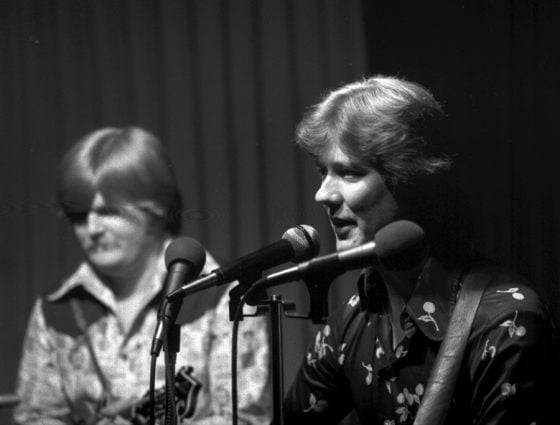
Ricky Skaggs and Tony Rice in 1975. Photo credit: Marty Godbey.
In fact, J.D. liked Jerry’s playing on the session so much that he invited Jerry to join the band. And there was a lot of mutual respect. Jerry said of Bobby, that he “just enshrined himself in the bass players’ hall of fame, when he kicked off ‘Born to Be with You.’ How in the world did he do this, and he’s left-handed, reaching across, slapping?”
It was an efficient recording session — two days.
Most of it was done live. Ricky had to overdub the viola and twin fiddles, and he did a few vocal parts, but there wasn’t much of that. Hugh said, “I had everybody’s ass outta bed and in that studio at 10 o’clock in the morning, and we finished by 5:50 or 6 in the afternoon … and went and had a good dinner! And we took a break [during the time in the studio] … we spent a little over six hours each day. That whole project took about 12 hours.”
J.D., Tony, and Ricky went back to Silver Spring and mixed the album with Bill McElroy between February 9-12. As the 0044 recording session proved, though, it was not really a matter of budget alone. Talent — on both sides of the console — made a major difference. Great albums needn’t always cost so much. The total cost for the studio and mixing, including J.D.’s expenses for the mixing — and even $10 to Ed Ferris for the loan of his bass — came to $5,931.79.
Hugh: “The bottom line is, riding back to Lexington — Bobby Slone and J.D. and I were listening to it — and Bobby said, ‘Hugh, that’s not really bluegrass. I’m not sure what it is, but I like the hell out of it.’”
So did the rest of the bluegrass world. Come the festival season, there was nothing but acceptance — the New South became, far and away, the hottest band of the summer of ’75.
The Holiday Inn came under new management as 1975 began, and the band shifted venues to the Lexington Sheraton. The band kept honing the repertoire they’d recorded, and other material compatible with their new sound. Then came the summer festival season. Jerry joined the group, and the band broke out on the road playing to great acclaim. The 0044 record wasn’t released until August, so a lot of festival goers were taken by complete surprise when they heard the new New South band live.
Hugh remembers the excitement at the bluegrass festivals: “The funny thing is, nobody wanted to follow the New South. You never heard so many damn excuses. ‘We got to get to Michigan … can we go on first?’ Nobody wanted to follow what those guys were doing. They were burning up the damn bluegrass circuit. It was great material, great vocals, and unbelievable picking.”
And Hugh didn’t want Bobby Slone to be under-appreciated. “His timing and his support and the way he was kind of the grease that kept all the wheels running … I love that man. He’s one of the outstanding human beings I was ever around in the music business. I put him and Vince Gill right at the top of the list. Bobby was the unsung hero in that whole deal.”
Bobby was, in turn, gracious in his remarks about Tony: “We had good timing. That was the main thing, right there, to start with. Tony had rhythm that just wouldn’t quit. His lead hand rhythm was so good.”
This is part two of a three-part series about the iconic bluegrass album that will be re-released by Rounder Records in an expanded vinyl edition for Record Store Day 2016. Read part three here.
